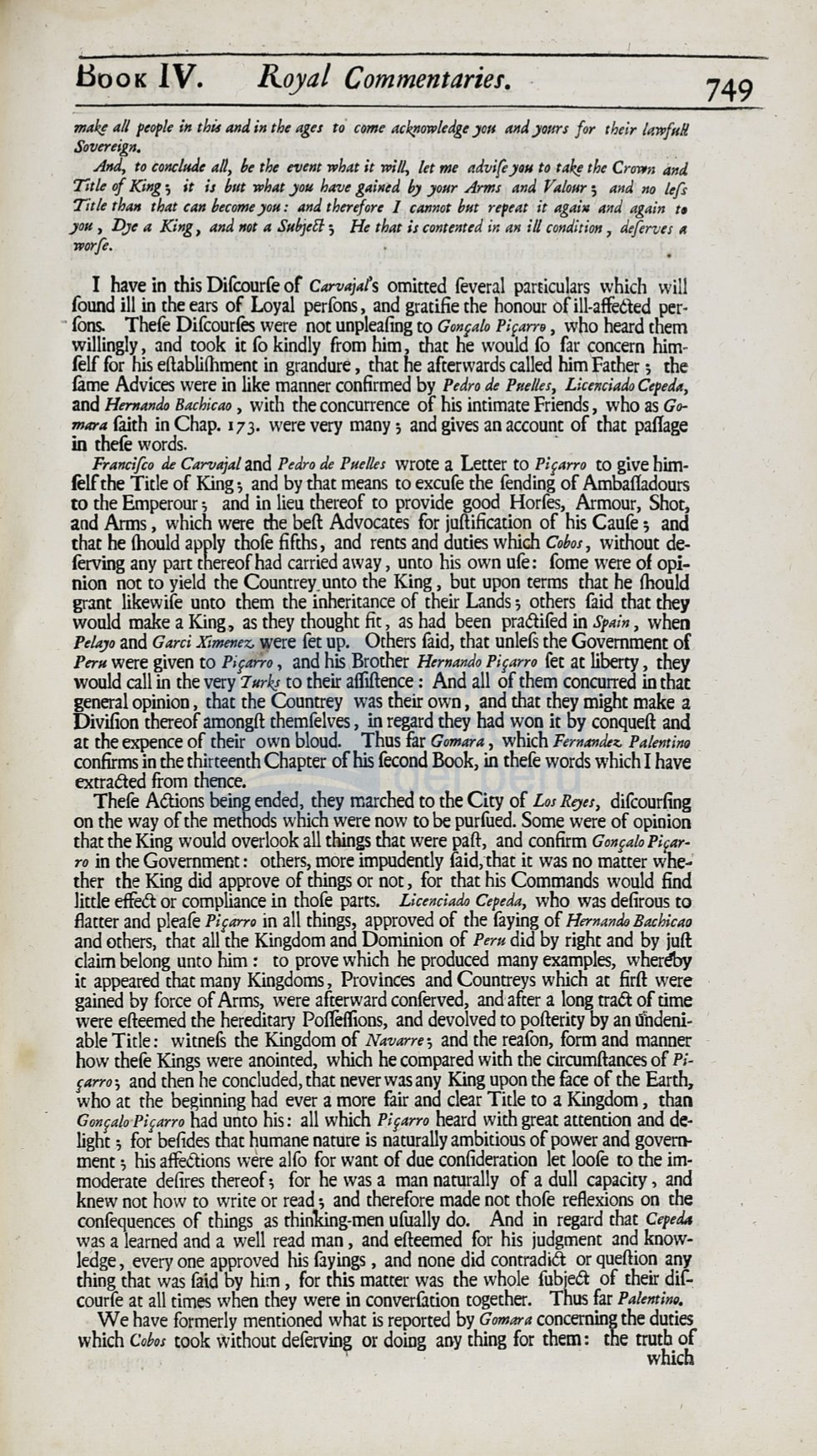

•
J
HooK
IV.
'
Royal Commentarin.
;,,ak!
ª!'
people in thú and in the ages to' come ack.,nowledge
JOII_
~ndyou~~ fo~
the.ir/11,'J1'/11H
Soveresgn,
.
. .
And, to conclude all, he the event what it will, !et me advi(eyou to tak! the Cr01Jn Í,~d
'Jí_tle
of
King; it is. 611t what you have gain~d
h
your Arms and Va!our; anr.( no /efs
Tit!e than that can hecomeyou: a_nd therefore
1:
cannot 6ut repeat _it agaiN 'and again t~
you, Dye a King, and nota Sub1ert; He that is contented'in an i!l condition
1
defarves a
worfe.
· .
.
·
•
I have in this Difcourfe of
C'án1ajat
s omitted fever~ parlifulars which will
found
ill
in che ears of Loyal perfons_ , and gracifie che honour o(i!l-affeéted per–
fons. Thefe Difcourfes were not unpleafing to
Gon
1
alo Pifam,
~o heard them
willingly, and took it fo kindly from him, thac he would
fo
far ·concern him–
felf for his eíl:abliíhment in grandure , chac he afterwards called him'Father ;
che
lame Advíces were in like manner confirmed by
Pedro.dePuelles, Lice'hciadoCepeda,
and
Hernando Bachicao
,
with che concurrence of his intimate Friends, who as
_Go–
m11ra
faich in Chap.
173.
were very many ; and gives an accounc of thac paílage
in
thefe words.
·
'
Francifco
de
Carvajal
and
Pedro de Puelles
wrote a Letter to
Pi
1
a;ro
to give him–
felfche Ticle of King; and by thac rneans
to
excuíe che fending of Arnbaíladours
to
che Emperour; and in lieu thereof to provide good Horíes,· Armour, Shoc,
and Arms , which were the beíl: Advocates for juíl:ification of his Caufe ; and
that he íhould apply chofe fifchs ,· and renes and duties whicli
Cohos,
withouc de–
ferving ahy pare chereofhad carried away, unto bis own ufe: forne were of opi–
nion noc to yield che Coumrey_unto che King , bue upon eei::ms that he íhould
grane likewiíe unto thern the inheritance of their Lands ; others faid chat
they .
would make a King.,, as they chought
fit,
as had been prafüfed in
Sp11in
,
when
Pela10
and
Garci Ximenez.
were fet up. Ochers faid, thac unlefs che Govemment o[
Peru
were given to
Pifarro
?
and his
1
Brocher
Hernando Pifarro
fec at libercy , they
would call in che very
'IHrk!
to their afliíl:ence : And all of them concurred in chat
general opinion , chat che Coumrey was their own, and thac chey mighc make a
Divifion chereof amongíl: chemfelves ,
in_
regard they had won it
by
conqueíl: and
at che expence of cheir own bloud,. Thus far
Gomara,
which
Fernande:c, Palentino
.
confirrns in che thirteenth Chapter of
his
fecond Book, in thefe words which I have
exrraéted from thence.
Thefe Afüons being ended, they marched to che Cicy of
Los
Reyes,
diícour6ng
on che way ofche rnethods which were now to
be
purfued. Sorne were of opinion
chat the King would overlook all
t}$gs
that were pafi, and confirm
Gon
1
alo
Pif.ar-749
ro
in che Govemment: others, more irnpudently faid;that it was no rnatter whe.:
cher che King did approve of things or noe, for chac his Commands would find
little effeét or compliance in chofe pares.
Licenciado Cepeda,
who was defirous
to
flaccer and plea[e
Pi
1
arro
in ali things, approved of che faying of
Hernando Bachicao
and ochers, that all che Kingdom and Dominion of
Peru
did by right and by juíl:
claim belong unto him : to prove which he produced rnany examples, whertfby
it appeared chac rnany Kingdoms, Provlnces and Countreys which ac
firíl:
were
gained by force ofArms, were afcerward conferved, and•afrer a long traét of time
were eíl:eemed che heredicary Poífeflions, and devolved to poíl:erity by an übdeni- '
able Ticle: wicneís che Kingdorn of
Navarre;
arid·che reafon, form and manner
how chefe Kings were anoimed, which he compared wích che circurníl:ances of
Pi–
farro;
and then he concluded, chat never was any King upon che face of che Earth
7
"'{ho ac the beginning had ever
a
more fair and clear Ticle to a Kingdom , than
Gon
1
alo-Pi
1
arro
had unto his: all which
P.if,arro
heard wich greac attention and de–
µghc ; for befides tbac qumane na~tire is nacurally ambicious of power and govem–
i:pent; bis affeétions were alfo for want of due conftderacion lec loofe to che im–
rnoderate delires thereof; for he was a man narqrally of a dull capacicy , and
knew noc how to write or read ; and cherefore rnade not chofe reflexions on the
confequences of chings as rhinking-rnen ufually do. And in regard thac
Ceped.,
was a learned and a well read man , and eíl:eerned for his judgment and know–
leage, every one approved his fayings , and none did contradiét or queíl:ion any
thing chat was faid
hy
him , for chis rnatter was che whoJe fubjeét of rheir dif:
couríe ac ali times when they were in converfation cogecher. Thus far
Palentino,
We have formerly mencioned what
is
reporced by
Gomara
concerning che duties
which
Cabos
took withouc defervin~ or doing any ching for them: the trutb of
.
.
.
.
.
~~














